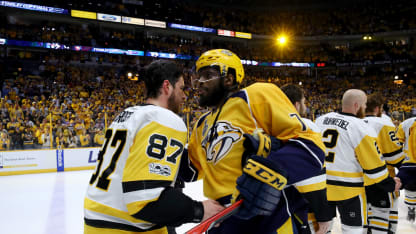A tip of the cap to the Pittsburgh Penguins, who defied injuries to key performers Kris Letang and Nick Bonino, and history itself in surviving four hellacious rounds in the Stanley Cup Playoffs to prevail for a second straight season as Stanley Cup champs.
It just doesn't happen. History tells us that over and over. Except it just did.
And kudos to captain and repeat playoff MVP Sidney Crosby whose resume continues to grow and grow, reducing any discussion about who the greatest player in the world is to mere mutterings.
Here are some post-Stanley Cup thoughts as we head into what could be the most interesting two weeks in recent NHL history with the expansion draft and awards in Las Vegas, and the draft in Chicago.
That's a wrap

© Bruce Bennett
Three-peat?
The Penguins were the first team since 1997-98 to win back to back championships. The last team to win three in a row? The New York Islanders who won four in a row from 1980-1983. That said, the way this Penguins team is constructed with future Hall of Famers Crosby and Evgeni Malkin down the middle and with Matt Murray, who pitched two shutouts to close out the final against Nashville for his second Cup win while still technically a rookie, are built for the long haul. Assuming Letang returns to form from his neck injury, there's no reason the Penguins won't be right in the mix again next season. Still, if history suggests repeating is nigh on impossible, the chances of three in a row go down exponentially.
Playoff System Thoughts
When the two best teams in the NHL's regular season (Washington and Pittsburgh) play in the second round of the playoffs, then you know something's very much awry with your playoff seeding. And when you have a team like the New York Rangers, who have a better chance at advancing to a conference final by being a wild card team and crossing over from the dominant Metropolitan Division to the weaker Atlantic Division, well, that's wrong too. Zero chance this gets fixed anytime soon but the league better get ready for it to become an annual storyline at a time when the focus should be on the teams and their playoff chances instead of the faults in the playoff seeding.
Nashville Skyline
How great was the story of the Predators' first march to a Stanley Cup Final? Heck, their first appearance beyond the second round of the playoffs. The fan support, the way they were embraced by top music stars, thus casting a giant light on the team, the city, the game, the league was off the charts. Couldn't happen to better hockey people than GM David Poile, assistant GM Paul Fenton, president Sean Henry and the rest who have toiled to make this market not just viable, but vibrant. The fact the 16th seed (they were actually tied with three other teams with 94 points, two of whom, the New York Islanders and Tampa, didn't make the playoffs) came within two wins of a championship presents an interesting dichotomy for the league. On one hand, the Predators' run illustrates that truly anything can happen if you make the playoffs. It also reinforces that the more parity there is in the league, the less relevance the 82-game regular season marathon has on the ultimate outcome.
Nashville Redux?
Have to feel for Nashville netminder Pekka Rinne, who was so good at home (he allowed three goals in three games in the final) and so miserable in Pittsburgh (he allowed 11 goals and was pulled twice). He's 34 and he looms as a key element in the question about whether this is a one and done thing for Nashville or whether they're ready to be a player in the Western Conference contender game. Juuse Saros is a capable young backup, but Pittsburgh with their tandem of Marc-Andre Fleury and Matt Murray the past two springs show you can't win without a number one and a 1A goaltender. Is Rinne still that and can Saros step into the breach if he's not? Still, this Nashville defense is all-world and Ryan Johansen proved he's a big-time center before his injury in the conference final. A return to the final? Not sure on that but this is a team that should book a ticket to the playoff dance in 2018.
On The Horizon?
What a great spring for long-suffering fans of the Edmonton Oilers and the Toronto Maple Leafs. The Oilers took Anaheim to Game 7 in the second round after dispatching last year's Western Conference champions San Jose in the first round. And this without Connor McDavid lighting it up. The Oil aren't going anywhere after being lost in the wilderness for a decade. As for the Leafs, they combined with Washington for what might have been the most entertaining series of the spring, a rollicking six-game set that featured five overtime games and another one-goal affair. The Leafs need help defensively to ensure they don't take a step back but this is the brightest outlook in a long time for a team that is without a Stanley Cup since 1967 and has won just one playoff series since 2003.
Call The Standard
Was the hockey great in the playoffs and especially as we got closer to the end? As one NHL coach put it, the compete level was off the charts. Blocked shots. Big hits. Everyone laying it on the line. It is the animal beauty of the playoffs. But the hockey? Not so much, as by the end of two months of playoff action, it's a war of attrition with the skill and creativity in short supply. Add in a complete abdication of calling the standards in terms of penalties, and the games late in the playoffs, including the final, looked more like street brawls than artistry. Can't ever recall a playoff season with the number of uncalled stick fouls and specifically cross-checks that we saw this spring. The Nashville/Anaheim conference final was a frenzy of such stick work. It's up to the competition committee and the league's GMs to demand that the penalties that are called in Game 1 of the regular season are called in Game 6 of the Stanley Cup Final. This isn't about poor officiating, this is about an unclear message being delivered from the top on down. This notion that somehow not calling penalties is a purer form of the game is nonsense. Every time a rule is broken and not called it destroys the integrity of the game. And that happened far too often this spring.
Let The Humans Be Human
Everyone wants the outcome of games to be decided properly as much as possible. We get that video review helps make that happen. Or it should. But in Game 1 of the final, Nashville was robbed of what would have been the first goal of the series when video review determined Filip Forsberg was a millimeter or two off-side, even though a linesman was standing a couple of feet from Forsberg when he took a pass at the Pittsburgh blue line and deemed the play good. Fair enough. Hated the call but if it was off-side then it was off-side. But then in Game 6 of the final, referee Kevin Pollack had his view blocked of a shot on goal and did not put himself in correct position to see the puck was still loose and was in the process of being pushed into the net for what would have been the first goal of the game when he blew the play dead. The rule book suggests video review could have been used to overturn the play, but the call stood and the Predators fell 2-0 on a late Patric Hornqvist goal. It was a monumental mistake that cost the Predators monumentally. At the end of the day, this is a game of mistakes played by humans. Given that the NHL isn't any closer to getting it all right all the time or even most of the time, maybe it's time to take a step back and allow the human element to return to all aspects of the game, improving the quality and flow of the action, especially since most reviews are designed to take goals away, which is counterintuitive to what the league is trying to achieve in driving up offense.
This story was not subject to approval of the National Hockey League or Dallas Stars Hockey Club. You can follow Scott on Twitter @OvertimeScottB.


















